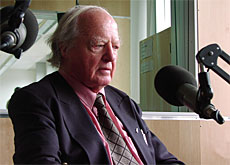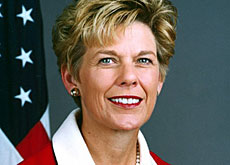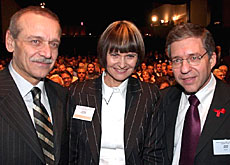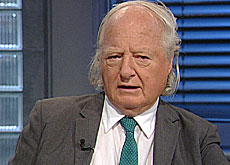“Democracy will not be built in Iraq”

One year after the United States-led invasion of Iraq, Middle East specialist Arnold Hottinger, says the United Nations must be involved if the country is to secure a stable future.
In an interview with swissinfo, Hottinger also blames the Israeli and US governments for the failure of the “Road Map” for peace in the occupied territories.
Hottinger is a Swiss journalist, who is acknowledged as one of this country’s foremost experts on Middle East affairs.
He spent more than 30 years as a correspondent in the region for the “Neue Zürcher Zeitung” and the Swiss Broadcasting Corporation.
His latest book on the Middle East is due to be published at the end of May.
swissinfo: Is the US attempt to create democracy in Iraq a step forward for the Middle East?
Arnold Hottinger: No, it’s a step back. Democracy will not be built in Iraq – that is quite clear. The danger is that we will open a second focal point of trouble and then we’ll have two infections in the Middle East: the Palestinian one and the Iraqi one.
swissinfo: Is it possible to build a democracy in the way the US wants to?
A.H.: Certainly not.
swissinfo: But Washington seems to think it is.
A.H.: Well, I’m not sure [the US government] really believes that. I think in an election year they are telling [US] voters what they think they want to hear.
Maybe [President George] Bush is sufficiently unintelligent to think that democracy can be introduced into Iraq in the way the US is attempting. But the neo-conservatives in the administration are rather more intelligent and know exactly that what they’re doing amounts to propaganda and nothing else.
swissinfo: Will the Americans stay in Iraq?
A.H.: They might have to stay because of oil. But they might also try a long-term provisional solution – occupying oil regions and letting the rest go to hell.
swissinfo: There are still attacks occurring on a daily basis in Iraq against military and civilian targets. Who is behind those attacks?
A.H.: Probably by now it’s a large coalition of forces. It was most likely members of [former president] Saddam Hussein’s secret service, who began the attacks because they knew they had no political future.
But by now anger at the Americans is sufficiently widespread – particularly in the Sunni part of the country – that Saddam’s supporters have been joined by a number of allies.
swissinfo: And what’s the point of the attacks?
A.H.: For those who want to try to return to power it’s a case of the more chaos the better at the moment.
Their thinking is that if they can make the country uncontrollable by the time the Americans leave, they will have a real chance of ruling the country once again.
swissinfo: Can there be any real progress in Iraq without the backing and involvement of the United Nations?
A.H.: I would say the best chance for a satisfactory solution in Iraq would be if the UN were involved.
But that’s going to prove difficult because things have been messed up considerably. The only way the UN can get involved is if the member countries help it collectively. That includes the US and European countries.
The UN itself has no power – it has only the power the member nations give it.
swissinfo: If a Shia-dominated administration comes to power in Iraq, how will that – if at all – shift the balance of power in the region?
A.H.: To the region as a whole it won’t make much difference – and it will never be purely Shia dominated, although the Shias hope they’ll be in the majority.
Maybe the prime minister will be a Shia. That hasn’t happened for a long time in Iraq.
But the question is whether we will ever get a government in Iraq or whether there will be 20 different governments fighting each other.
swissinfo: So your prognosis is that it’s not a particularly positive outlook for the future of Iraq?
A.H.: Well, if people make mistakes they have to live with the consequences. The mistake was to attack this country and not to think of what would happen afterwards.
swissinfo: Turning to the Israel-Palestinian question – is there hope for peace?
A.H.: Not at the moment. There would need to be some basic changes and only then would there be hope.
Those changes would entail the removal of both Bush and [the Israeli prime minister Ariel] Sharon from power.
swissinfo: And the US-backed Road Map?
A.H.: It’s dead – stone dead. These two men have managed to kill it. So they have to go and then we can start a new peace process. Maybe.
swissinfo: What about the Swiss-backed Geneva Accord? That’s received quite a lot of coverage. Is that a positive basis on which to build a peaceful solution?
A.H.: It was never seen as a direct possibility for action. It was conceived as a way of showing people what the possibilities could be.
At the moment the Israelis and the Palestinians don’t see any way out [of the stalemate] and the idea was to show them that peace could be obtained if there were a change in policy and if they were prepared to put pressure on their governments.
There need to be governments in power that want to implement a peace policy. But that is never going to happen as long as Bush and Sharon are in power.
swissinfo-interview: Jonathan Summerton
The US-led invasion of Iraq started on March 20, 2003.
An interim constitution signed by Iraq’s US-appointed Governing Council is due to take effect when Iraqi sovereignty is restored at the end of June.
The Swiss-backed Geneva Accord was brokered by Israeli and Palestinian opposition groups after two years of secret negotiations.
The agreement outlines a plan for the division of Jerusalem and the creation of a Palestinian state, and covers the issues of Palestinian refugees and Jewish settlements.

In compliance with the JTI standards
More: SWI swissinfo.ch certified by the Journalism Trust Initiative



You can find an overview of ongoing debates with our journalists here . Please join us!
If you want to start a conversation about a topic raised in this article or want to report factual errors, email us at english@swissinfo.ch.